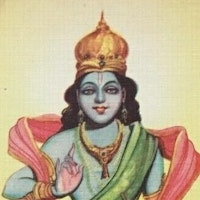When the light of Atman Drives out our darkness That light shines forth from us, A sun in splendor, The revealed Brahman.
Krishna

The Light of Atman
Topic: Truth, Law, & Principle
The Atman is the light: The light is covered by darkness: This darkness is delusion: That is why we dream. When the light of Atman Drives out our darkness That light shines forth from us, A sun in splendor, The revealed Brahman.
Krishna (/ˈkrɪʃnə/; IAST: Kṛṣṇa [ˈkr̩ʂɳɐ]) is a major deity in Hinduism. The name comes from a Sanskrit word (कृष्ण, kṛṣṇa) that means "black", "dark", "dark blue" or “the all attractive”. He is worshipped as the eighth avatar of Vishnu and also as the Supreme god in his own right. He is the god of protection, compassion, tenderness, and love; and is one of the most popular and widely revered among Indian divinities. Krishna's birthday is celebrated every year by Hindus on Krishna Janmashtami according to the lunisolar Hindu calendar, which falls in late August or early September of the Gregorian calendar.
The anecdotes and narratives of Krishna's life are generally titled as Krishna Līlā. He is a central character in the Mahabharata, the Bhagavata Purana, the Brahma Vaivarta Purana, and the Bhagavad Gita, and is mentioned in many Hindu philosophical, theological, and mythological texts. They portray him in various perspectives: as a god-child, a prankster, a model lover, a divine hero, and the universal supreme being. His iconography reflects these legends, and shows him in different stages of his life, such as an infant eating butter, a young boy playing a flute, a young boy with Radha or surrounded by female devotees; or a friendly charioteer giving counsel to Arjuna.
The Bhagavad Gita
Wilson, Andrew, editor. World Scripture - a Comparative Anthology of Sacred Texts. Paragon House, 1991, p. 381 [Bhagavad Gita 5.15-16].

Krishna
Theme: The Light of Truth

Commentary by Sri Sridhara Swami of Rudra Sampradaya:
Bhagavad Gita 5.15-16 [Short Commentary]
Bhagavad Gita 5.15-16 [Longer Commentary]
Atman
Resources
Related Quotes
Copyright © 2017 – 2026 LuminaryQuotes.com About Us